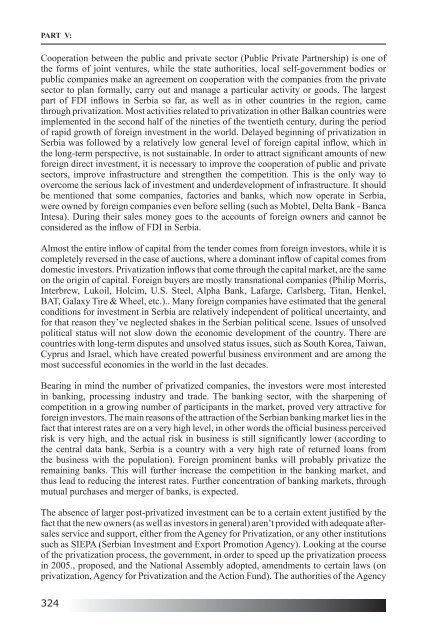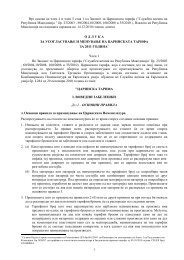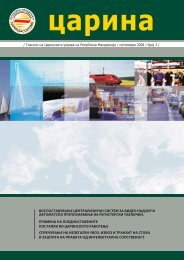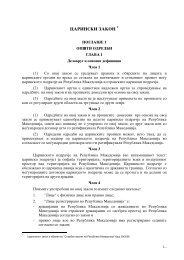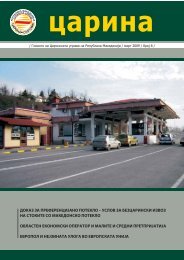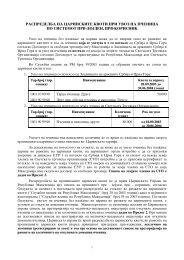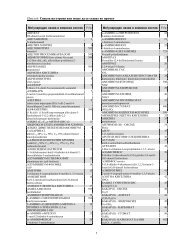REGIONAL COOPERATION AND ECONOMIC INTEGRATION
REGIONAL COOPERATION AND ECONOMIC INTEGRATION
REGIONAL COOPERATION AND ECONOMIC INTEGRATION
- No tags were found...
You also want an ePaper? Increase the reach of your titles
YUMPU automatically turns print PDFs into web optimized ePapers that Google loves.
PART V:<br />
Cooperation between the public and private sector (Public Private Partnership) is one of<br />
the forms of joint ventures, while the state authorities, local self-government bodies or<br />
public companies make an agreement on cooperation with the companies from the private<br />
sector to plan formally, carry out and manage a particular activity or goods. The largest<br />
part of FDI inflows in Serbia so far, as well as in other countries in the region, came<br />
through privatization. Most activities related to privatization in other Balkan countries were<br />
implemented in the second half of the nineties of the twentieth century, during the period<br />
of rapid growth of foreign investment in the world. Delayed beginning of privatization in<br />
Serbia was followed by a relatively low general level of foreign capital inflow, which in<br />
the long-term perspective, is not sustainable. In order to attract significant amounts of new<br />
foreign direct investment, it is necessary to improve the cooperation of public and private<br />
sectors, improve infrastructure and strengthen the competition. This is the only way to<br />
overcome the serious lack of investment and underdevelopment of infrastructure. It should<br />
be mentioned that some companies, factories and banks, which now operate in Serbia,<br />
were owned by foreign companies even before selling (such as Mobtel, Delta Bank - Banca<br />
Intesa). During their sales money goes to the accounts of foreign owners and cannot be<br />
considered as the inflow of FDI in Serbia.<br />
Almost the entire inflow of capital from the tender comes from foreign investors, while it is<br />
completely reversed in the case of auctions, where a dominant inflow of capital comes from<br />
domestic investors. Privatization inflows that come through the capital market, are the same<br />
on the origin of capital. Foreign buyers are mostly transnational companies (Philip Morris,<br />
Interbrew, Lukoil, Holcim, U.S. Steel, Alpha Bank, Lafarge, Carlsberg, Titan, Henkel,<br />
BAT, Galaxy Tire & Wheel, etc.).. Many foreign companies have estimated that the general<br />
conditions for investment in Serbia are relatively independent of political uncertainty, and<br />
for that reason they’ve neglected shakes in the Serbian political scene. Issues of unsolved<br />
political status will not slow down the economic development of the country. There are<br />
countries with long-term disputes and unsolved status issues, such as South Korea, Taiwan,<br />
Cyprus and Israel, which have created powerful business environment and are among the<br />
most successful economies in the world in the last decades.<br />
Bearing in mind the number of privatized companies, the investors were most interested<br />
in banking, processing industry and trade. The banking sector, with the sharpening of<br />
competition in a growing number of participants in the market, proved very attractive for<br />
foreign investors. The main reasons of the attraction of the Serbian banking market lies in the<br />
fact that interest rates are on a very high level, in other words the official business perceived<br />
risk is very high, and the actual risk in business is still significantly lower (according to<br />
the central data bank, Serbia is a country with a very high rate of returned loans from<br />
the business with the population). Foreign prominent banks will probably privatize the<br />
remaining banks. This will further increase the competition in the banking market, and<br />
thus lead to reducing the interest rates. Further concentration of banking markets, through<br />
mutual purchases and merger of banks, is expected.<br />
The absence of larger post-privatized investment can be to a certain extent justified by the<br />
fact that the new owners (as well as investors in general) aren’t provided with adequate aftersales<br />
service and support, either from the Agency for Privatization, or any other institutions<br />
such as SIEPA (Serbian Investment and Export Promotion Agency). Looking at the course<br />
of the privatization process, the government, in order to speed up the privatization process<br />
in 2005., proposed, and the National Assembly adopted, amendments to certain laws (on<br />
privatization, Agency for Privatization and the Action Fund). The authorities of the Agency<br />
324


